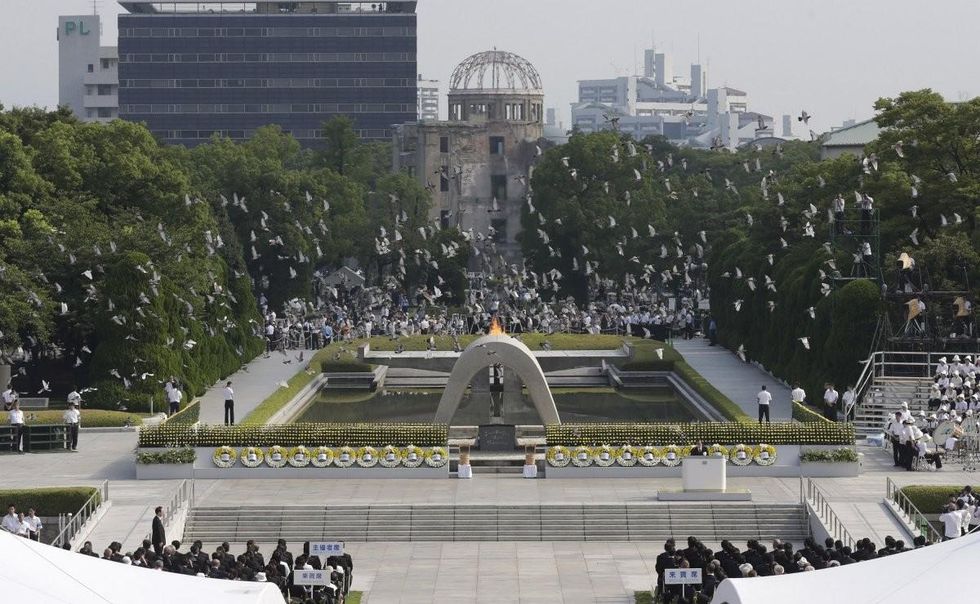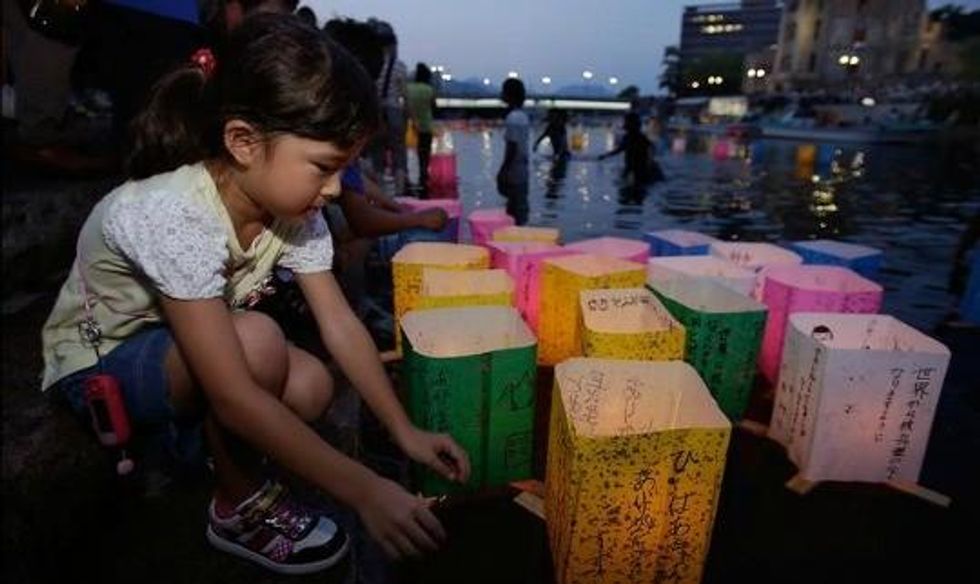In Hiroshima, Tens of Thousands Call Out for Nuclear Disarmament
68th anniversary of Hiroshima bombings also draws attention to ongoing nuclear disaster at Fukushima

The crowd came together for the annual ceremony at Hiroshima's Peace Memorial Park, which sits near the site of the nuclear attack that took the lives of over 140,000 people near the end of World War II.
"The atomic bomb is the ultimate inhumane weapon and an absolute evil," said Hiroshima mayor Kazumi Matsui to the crowd of nearly 50,000 which included many of the aging victims who survived the attack.
Matsui continued by championing those survivors--"who know the hell of an atomic bombing"--for their continued fight against the "evil" of nuclear weapons.
Matsui also criticized the current government headed by Prime Minister Shinzo Abe for its plans to sell nuclear power technology to India, one of four countries that have not signed the Treaty on the Non-Proliferation of Nuclear Weapons.
"The government's ongoing negotiations may bring economic benefits to Japan and India, but they will hamper efforts to eliminate nuclear weapons," said Matsui.
Matsui also tied fallout from the atomic bomb to the ongoing catastrophe at the nuclear power plant in Fukushima and the government's push to restart Japan's other nuclear reactors.
Matsui stated, "This summer, eastern Japan is still suffering the aftermath of the great earthquake and the nuclear accident. The desperate struggle to recover hometowns continues. The people of Hiroshima know well the ordeal of recovery."
"We urge the national government to rapidly develop and implement a responsible energy policy that places top priority on safety and the livelihoods of the people," Matsui said.
Most of Japan's nuclear power plants were taken offline following Fukushima's meltdown. The plant's operator TEPCO has failed to this day to maintain stability at the plant and released a statement on Tuesday warning that it is struggling in its latest efforts to stop radioactive groundwater from flowing from the plant into the sea.
Abe also spoke at the ceremony but he did not mention Fukushima nor his current plans to sell nuclear power technology to India.

_______________________
An Urgent Message From Our Co-Founder
Dear Common Dreams reader, The U.S. is on a fast track to authoritarianism like nothing I've ever seen. Meanwhile, corporate news outlets are utterly capitulating to Trump, twisting their coverage to avoid drawing his ire while lining up to stuff cash in his pockets. That's why I believe that Common Dreams is doing the best and most consequential reporting that we've ever done. Our small but mighty team is a progressive reporting powerhouse, covering the news every day that the corporate media never will. Our mission has always been simple: To inform. To inspire. And to ignite change for the common good. Now here's the key piece that I want all our readers to understand: None of this would be possible without your financial support. That's not just some fundraising cliche. It's the absolute and literal truth. We don't accept corporate advertising and never will. We don't have a paywall because we don't think people should be blocked from critical news based on their ability to pay. Everything we do is funded by the donations of readers like you. Will you donate now to help power the nonprofit, independent reporting of Common Dreams? Thank you for being a vital member of our community. Together, we can keep independent journalism alive when it’s needed most. - Craig Brown, Co-founder |

The crowd came together for the annual ceremony at Hiroshima's Peace Memorial Park, which sits near the site of the nuclear attack that took the lives of over 140,000 people near the end of World War II.
"The atomic bomb is the ultimate inhumane weapon and an absolute evil," said Hiroshima mayor Kazumi Matsui to the crowd of nearly 50,000 which included many of the aging victims who survived the attack.
Matsui continued by championing those survivors--"who know the hell of an atomic bombing"--for their continued fight against the "evil" of nuclear weapons.
Matsui also criticized the current government headed by Prime Minister Shinzo Abe for its plans to sell nuclear power technology to India, one of four countries that have not signed the Treaty on the Non-Proliferation of Nuclear Weapons.
"The government's ongoing negotiations may bring economic benefits to Japan and India, but they will hamper efforts to eliminate nuclear weapons," said Matsui.
Matsui also tied fallout from the atomic bomb to the ongoing catastrophe at the nuclear power plant in Fukushima and the government's push to restart Japan's other nuclear reactors.
Matsui stated, "This summer, eastern Japan is still suffering the aftermath of the great earthquake and the nuclear accident. The desperate struggle to recover hometowns continues. The people of Hiroshima know well the ordeal of recovery."
"We urge the national government to rapidly develop and implement a responsible energy policy that places top priority on safety and the livelihoods of the people," Matsui said.
Most of Japan's nuclear power plants were taken offline following Fukushima's meltdown. The plant's operator TEPCO has failed to this day to maintain stability at the plant and released a statement on Tuesday warning that it is struggling in its latest efforts to stop radioactive groundwater from flowing from the plant into the sea.
Abe also spoke at the ceremony but he did not mention Fukushima nor his current plans to sell nuclear power technology to India.

_______________________

The crowd came together for the annual ceremony at Hiroshima's Peace Memorial Park, which sits near the site of the nuclear attack that took the lives of over 140,000 people near the end of World War II.
"The atomic bomb is the ultimate inhumane weapon and an absolute evil," said Hiroshima mayor Kazumi Matsui to the crowd of nearly 50,000 which included many of the aging victims who survived the attack.
Matsui continued by championing those survivors--"who know the hell of an atomic bombing"--for their continued fight against the "evil" of nuclear weapons.
Matsui also criticized the current government headed by Prime Minister Shinzo Abe for its plans to sell nuclear power technology to India, one of four countries that have not signed the Treaty on the Non-Proliferation of Nuclear Weapons.
"The government's ongoing negotiations may bring economic benefits to Japan and India, but they will hamper efforts to eliminate nuclear weapons," said Matsui.
Matsui also tied fallout from the atomic bomb to the ongoing catastrophe at the nuclear power plant in Fukushima and the government's push to restart Japan's other nuclear reactors.
Matsui stated, "This summer, eastern Japan is still suffering the aftermath of the great earthquake and the nuclear accident. The desperate struggle to recover hometowns continues. The people of Hiroshima know well the ordeal of recovery."
"We urge the national government to rapidly develop and implement a responsible energy policy that places top priority on safety and the livelihoods of the people," Matsui said.
Most of Japan's nuclear power plants were taken offline following Fukushima's meltdown. The plant's operator TEPCO has failed to this day to maintain stability at the plant and released a statement on Tuesday warning that it is struggling in its latest efforts to stop radioactive groundwater from flowing from the plant into the sea.
Abe also spoke at the ceremony but he did not mention Fukushima nor his current plans to sell nuclear power technology to India.

_______________________

